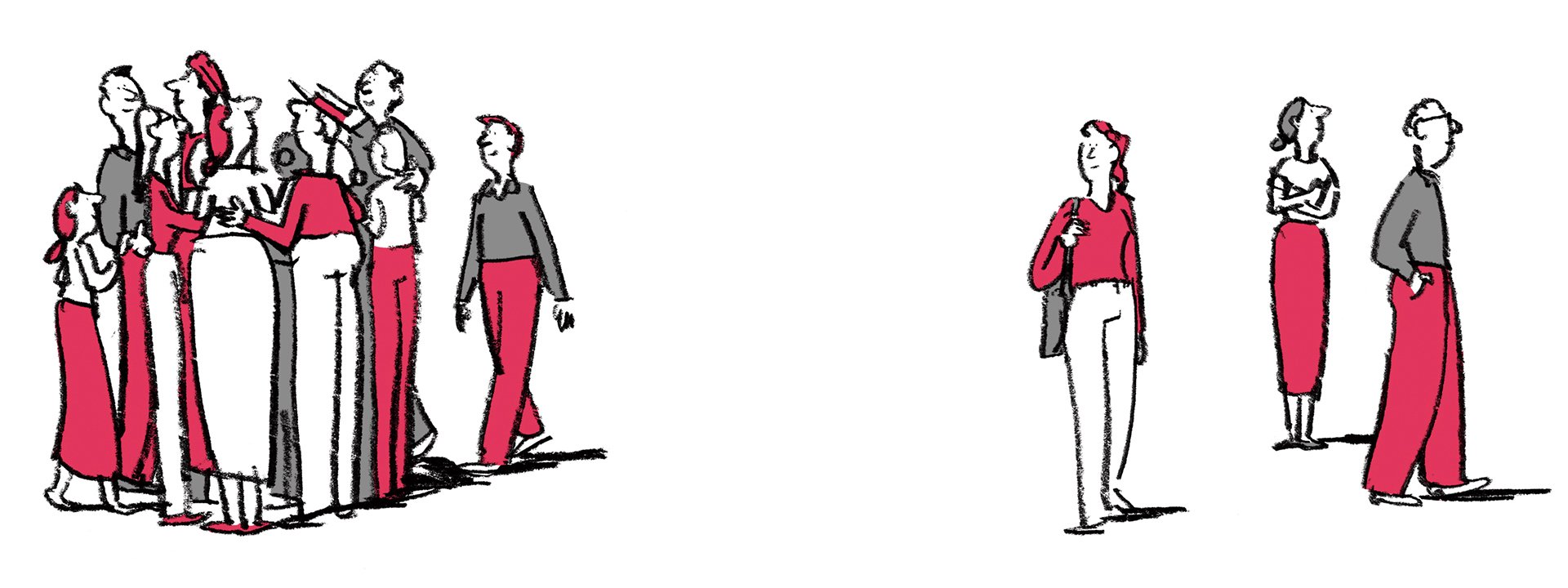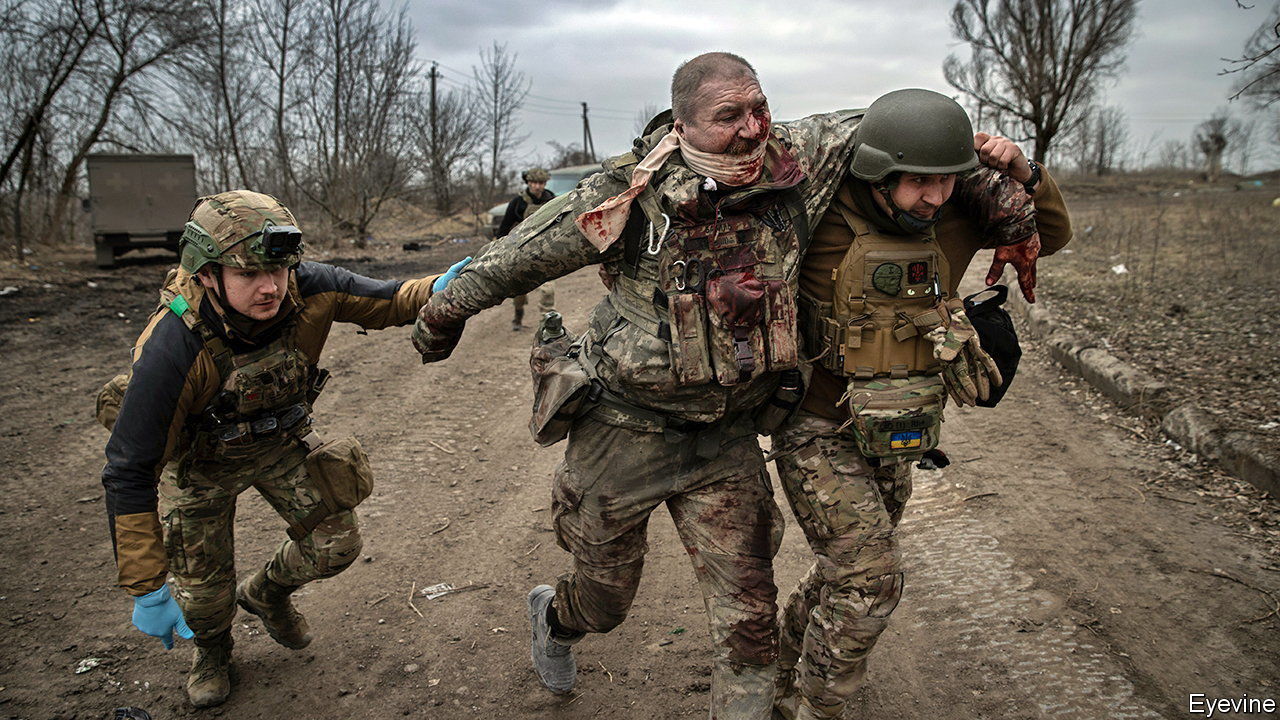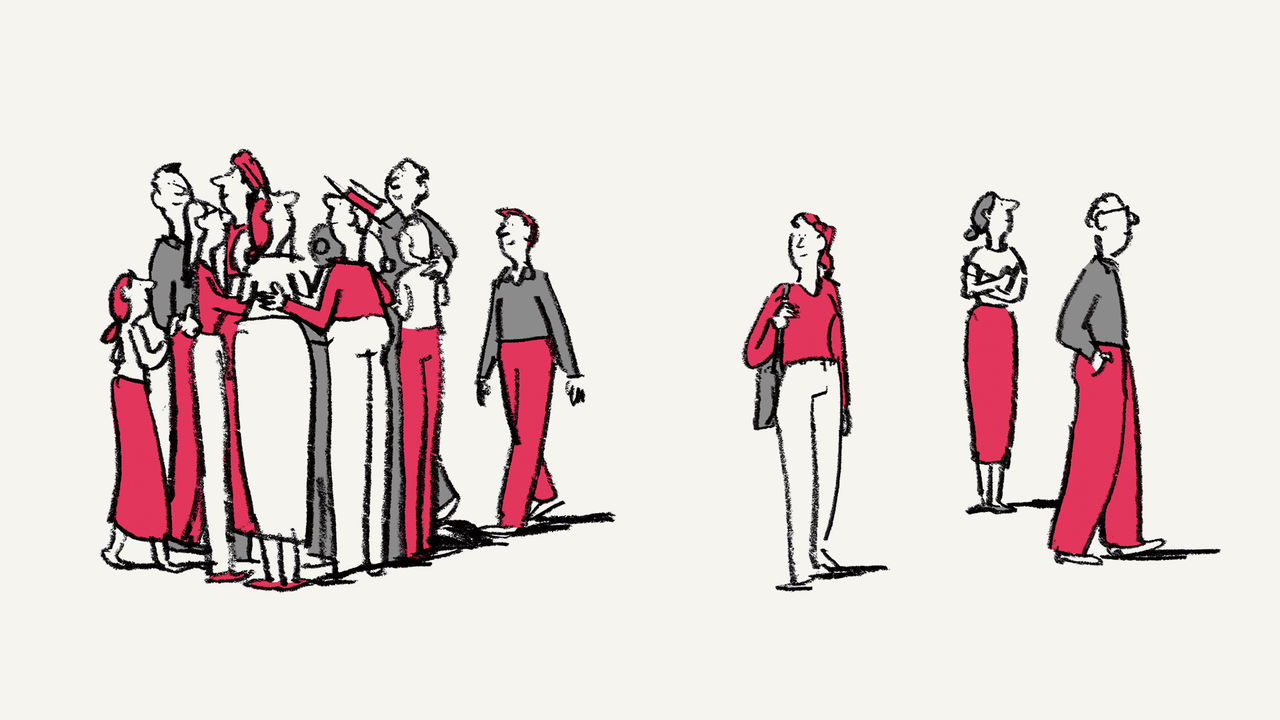Western values are steadily diverging from the rest of the world’s
People’s principles were expected to align as countries got richer. What happened?

IN 1981 OVER 40% of the world’s population lived in extreme poverty. But economic growth was starting to accelerate in developing countries. And Ron Inglehart, a professor at the University of Michigan, was organising a worldwide survey team to test the theory that, as peasant farmers escape poverty, they begin to think and behave differently, as people in the past had done when they joined the middle classes.
They might give a higher priority to education, to widening their children’s knowledge, than their own parents had done. They might give greater weight to their own experience and reasoning, and less to religious books or the authority of kings. And perhaps these new ways, these basic values, would begin to converge around the world. Such matters, Inglehart thought, could be tested by asking questions which revealed underlying values such as “How important is religion in your life?”, “Would you be happy living next to a foreigner?” and “Can you trust most people?”
Forty years later, only 8% of the world’s population is still in extreme poverty; more than half, on some measures, count as middle class. The World Values Survey (WVS), Inglehart’s baby, has become the world’s biggest social-research network. Every five years or so its researchers sally out into the field interviewing, at last count, almost 130,000 people in 90 countries. Yet its latest wave of results, which covers 2017-22, provides only partial endorsement of the idea that basic values tend to converge as people get richer. In significant ways, the differences between how people think in different parts of the world seem to be widening.
Inglehart (who died in 2021) argued that security—or, to be precise, insecurity—is at the root of how people think and what they value. In an insecure world in which children or crops can be wiped out by disease or drought overnight, family is often the only defence against disaster, while church, mosque or temple are the main providers of consolation or explanation. But as wealth spreads, basic insecurity recedes. In a more stable environment, people may think more for themselves.
Inglehart thought this process occurred in two slightly different forms. He invented ways to measure each.
The first assesses the influence of customary sources of authority, such as family and religion. At one end of this spectrum lies respect for tradition. At the other, secular beliefs and more scientific thinking.
He called this the “tradition-secular” axis. Your position on it depends on answers to questions such as “Do you believe in God?” and “How important is obedience in children?”
The second measure assesses people’s attachment to an in-group. At one end lies close association with an ethnicity, nation or race; there is a sharp division between “us” and “them”. At the other, greater individualism and thinking for yourself.
This is based on questions such as “Can you trust most people?” or “Would you ever sign a petition?” This is a kind of political-tribalism index, though the researchers are too polite to call it that. Together these indices create a map of global values.
Now you know how it works, try to guess where these four countries sit today by dragging them on to the chart
America
China
Sweden
Pakistan
Neighbouring populations loosely cluster together: Europeans in one area, Latin Americans in another, African and Islamic countries in a third, etc. And values tend not to change quickly. As Pippa Norris, one of Inglehart’s co-authors says, “If they do, they are opinions, not values.”
But in recent decades there has been a substantial shift—and an extraordinary one.
But in recent decades there has been a substantial shift—and an extraordinary one.
Orthodox countries have become more traditional and have moved downwards.
Latin American ones have become less so and moved up.
English-speaking countries used to be clearly distinct from Protestant Europeans (with stronger religious affiliations) but the two groups have become harder to distinguish.
Take the map from the survey wave ending in 1998. In some ways it looks similar to today’s. In both, Protestant Europeans are the most secular and individualistic. Catholic Europeans hold similar views, though less strongly. In Islamic and African countries, religion and family hold sway. What the WVS calls “Confucian” countries, including China, Japan and South Korea, are a mixture. They hold secular values as strongly as Europeans; when responding to assertions such as “where religion and science conflict, religion is always right”, they are even less likely to agree than Germans or Dutch. But they are nothing like as tolerant as those nations towards gay people and other minorities.
Two decades ago a group of countries combined religious conviction with support for individualism and self-expression, that is, a sort of hybrid of traditional and modern values. They included America, Ireland and some Latin American countries, such as Venezuela. This amalgam put them at the bottom right corner. Many Orthodox countries (such as Russia and Romania) showed the inverse: weak religious values but strong “tribal”, or collective, ones. They were irreligious ethno-nationalists, clustered in the top left.

World Values Survey
1990-98
60 countries
2017-22
90 countries
↑ Secular
↑ Secular
← Survival
← Survival
Self-expression →
Self-expression →
↓ Traditional
↓ Traditional
If you look at the map of 1998, you will see countries scattered across all four quadrants. In the map of 2022, by contrast, most are in just two. The outliers of bottom right and top left are fewer. Most countries are now aligned along a diagonal that starts in the bottom left, with strong traditional and collective values, and rises towards the top right, with more secular values and individualism. In 2022 there is a clear “best fit” line. In 1998, there was not.
On the face of it, this shift suggests that people do think differently as they escape from poverty and insecurity. The diagonal line implies that countries are either traditional-cum-collective or rational-cum-individualistic. The poorest countries are (mostly) at one end and the richest (mostly) at the other. Eventually, presumably, poorer countries will shuffle along the diagonal.
Perhaps. But at the moment, the WVS findings suggest this is not happening without obstacles and detours. If poorer countries were indeed converging with rich ones in terms of values, you would expect that they would be the ones where values are changing fastest, whereas the countries they are catching up with would be more stable. In fact the survey finds the opposite. Countries that are already the most secular and individualistic are changing fastest and becoming even more secular; those that are most traditional and clannish are changing less and sometimes becoming more traditional, not less.
In 1998, 38% of Protestant Europeans and 32% of Muslims said most people could be trusted. By 2022 trust in Europe had risen (with more than half of Europeans saying that they trusted people) but it had plummeted in Islamic countries, where just 15% of respondents said people are trustworthy. In 1998 Catholic Europeans and Latin Americans also had comparable levels of trust. By 2022, the proportion of Catholic Europeans who said they trusted people was three times higher than that of Latin Americans.
Just as mistrust of strangers is a measure of collective values, so is unwillingness to sign petitions. This is because clannish societies tend not to believe that governing authorities will act in their interests, and for fear of reprisals. In 2022 nearly half of respondents in Latin American and Orthodox countries said they would never sign a petition. That marked a big increase in Latin America since 1998, and a small one in the Orthodox places. In contrast, the number of Europeans who said they would never sign a petition fell markedly, to levels roughly half those in most of the rest of the world.
On measure after measure—from thinking that children ought to be obedient, to tolerance of homosexuality, to agreeing that “when religion and science conflict, religion is always right”—European countries have moved in the direction of greater individualism and secularism in the past 25 years. That is also true of America. Though Americans have long been somewhat more religious than most Europeans, over time they have moved towards greater individualism and secularism at least as much as Europeans have.
In 1981, for example, 47% of Americans described themselves as non-religious (saying God was not important in their lives, that they did not attend church services and so on). The share in Sweden was 58%. By 2022 the share in America had risen by 14 points, almost matching Sweden’s. Meanwhile Orthodox, Islamic and Latin American countries have seen either smaller changes or, in some cases, movement towards more traditionalism and collectivism. That does not necessarily invalidate the idea that global values will one day converge. But it does suggest that day may be some way off.
Mind the gap
The findings raise three further questions. First, how long can this gap continue to widen? In particular, can Europeans and Americans really go on getting ever more individualistic and secular? “People keep asking me if there is a limit,” says Christian Welzel, a professor at Leuphana University in Luneburg, in Germany, and another of Inglehart’s co-authors. “But I haven’t seen any sign yet.” Dr Welzel has trawled through the WVS data by age cohort. He finds that in every region each generation becomes more individualistic and secular than the one before.
In Europe the gap between old and young is especially large, and many times greater than in Islamic or Orthodox countries. This implies that the shift towards more self-expression will continue in the next generation. In America there is a values gap between the more religious and more secular parts of the country, which could in theory imply that the religious areas (in the South and Midwest) might not be taking part in the drift towards secularism. Yet even this seems wrong. The gap between the most and least religious states has not changed materially since 1981. Whatever it is that is causing America’s unusually polarised politics, it is not—the WVS suggests—a result of a fundamental shift in what people believe in different parts of the country.
Second, what are the political and geopolitical implications? At a broad level, values and politics are obviously and intimately connected. Traditional values seem to be more associated with autocracies; one-person-one-vote systems embody individualistic values. It can be no coincidence that during the past decade authoritarian populists have done especially well in two of the regions where the slowdown or reversal of secular-rational values has occurred: Orthodox countries (such as Russia and Belarus) and Latin America (Brazil, Nicaragua, Venezuela).
In Orthodox, Latin American and Islamic countries support for democracy also plummeted, as measured by the share of the population saying they thought it was good or fairly good to have a strong leader who does not have to bother with parliament or elections. In all three regions the share saying they thought this rose by between one-third and two-thirds between 1998 and 2022. That hardly bodes well for the future of democracy.
Even so, there is no simple relationship between values and politics, as the example of American religious voters suggests. The persistence of the devout and traditionalist right in Europe and America is clearly connected with discontent at spreading individualism. But it is not so clear whether voters have changed and organised themselves into more powerful far-right parties, or whether the parties have simply managed more successfully than in the past to sell their politics to voters who have not changed that much themselves.
A similar point can be made about values and geopolitics. International conflicts over values seem to be spreading. Barely a day goes by without clashes between Western and non-Western governments over LGBT+ rights. After President Joe Biden criticised Uganda’s introduction of a harsh anti-gay law earlier this year Anita Among, the Ugandan parliament’s speaker, said “The Western world will not come to rule Uganda.” And when Recep Tayyip Erdogan, Turkey’s president, threatened to block Sweden’s application to join NATO because a man in Sweden had burned pages from the Koran, he was appealing to Turks’ strong religious convictions. But to many individualistic Swedes the book-burner had every right to free expression, as long as he obeyed the law.
Disagreements about values also pervade the superpower rivalry between America and China. Chinese leaders complain endlessly that there are no such things as “the so-called universal values of the West” (as Xi Jinping, China’s president, puts it), and that appeals by the American government to such values are a mere smokescreen for a new kind of imperialism. Dilma Rousseff, a former president of Brazil, calls Western liberalism “this imposed value system”.
Even so, many of these conflicts would surely have happened regardless of differences over values. China would have challenged America for strategic and technological reasons. Turkey might have blocked Sweden to extract concessions from NATO. Vladimir Putin, Russia’s president, claims to have invaded Ukraine because that country, once an integral part of the Orthodox world, is imbibing European habits of thought which (Mr Putin thinks) threaten Russia. But Mr Putin had many reasons for his decision, paranoid as well as calculated. The point is not that differences in values are artificial. But they may not be determinative. To authoritarian governments, “values” are an excuse as well as a set of beliefs.
Third, what does all this mean for arguments about “universal values”? The WVS implies that secular and liberal values are no more universal than religious and authoritarian ones. The two sets of values sit at opposite ends of the same spectrum of opinion; both are ways in which people adapt to their circumstances, whether secure or insecure. In that sense Mr Xi and others have a point: such values are not universal. But they are not entirely conditional upon a country’s history or political culture.
As a rule of thumb, as prosperity spreads, life expectancy rises, fertility rates fall, and education expands, people tend to move towards the secular/rational end of the spectrum. Mr Welzel describes this as a shift in mindset from “prevention focus” (in which people’s main concern is preventing harm and loss to themselves and their family) to what he calls “promotion focus” (under which people seek self-expression and freedom of choice about how to live their lives).
The WVS, however, finds that the speed at which this shift happens varies greatly in different countries. In some places it even goes into reverse. Different generations adjust more or less readily. Governments intervene to slow things down if it suits them. And it is clear that getting wealthier is not necessarily enough to trigger the shift in values, because countries that are getting richer can often feel less secure.
For all these reasons, traditional ways of thinking persist and the convergence of values widely expected to accompany economic growth is far from complete. Yet the impact of greater security on people’s values does not go away. Slowly, unsurely, religious and authoritarian values tend to lose some of their appeal; secular and liberal values tend to gain. And the battle over values plays out between the two poles.■
Sources: The Economist; World Values Survey: Round Seven, Inglehart et al. 2022





